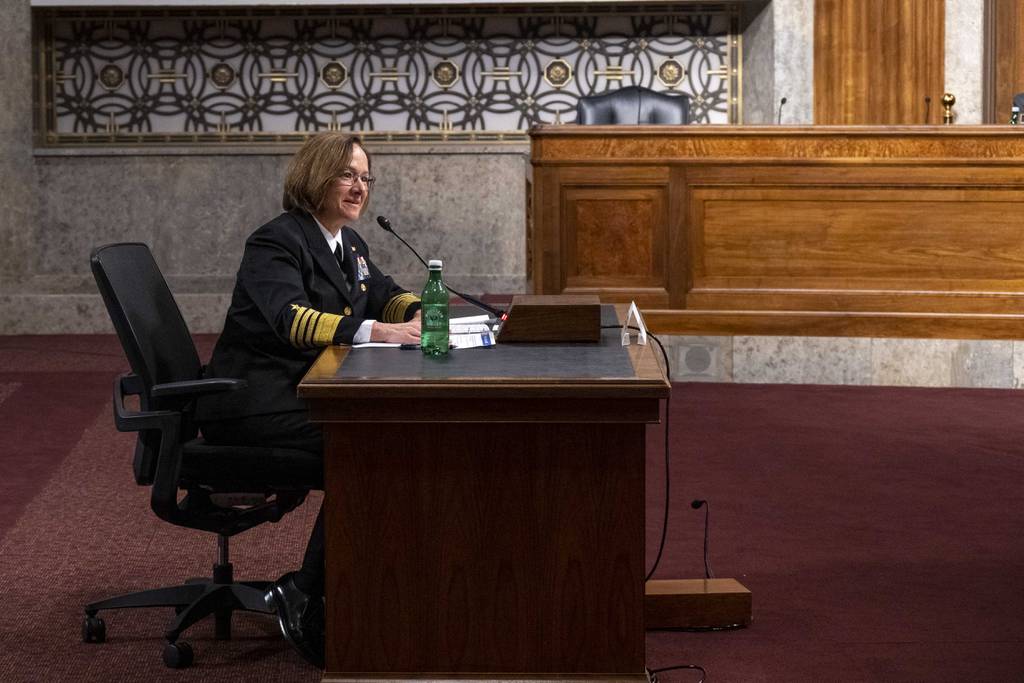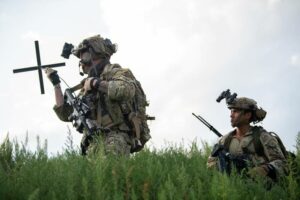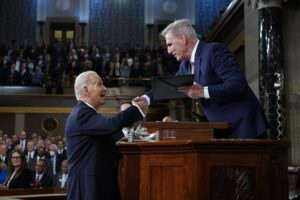
Senate lawmakers in the next few days will move ahead with confirmation votes on key leadership spots for the Navy, Air Force and Marine Corps, and Democratic leaders are eyeing ways soon after to force through hundreds of other senior officer promotions which have been held up for months.
On Tuesday night, Senate Majority Leader Chuck Schumer, D-N.Y., filed procedural motions to move ahead on the nominations of Adm. Lisa Franchetti to serve as chief of naval operations, Gen. David Allvin to be Air Force chief of staff and Lt. Gen. Christopher Mahoney to be assistant commandant of the Marine Corps.
Depending on if Democratic leaders get cooperation from Republican members on vote timelines, the three military officers could be confirmed as early as Thursday. If not, final votes on all three will take place early next week.
The moves come after Republican members filed petitions forcing a vote on the three leaders. Both Franchetti and Allvin would step into vacancies on the Joint Chiefs of Staff. Franchetti would become the first uniformed woman ever to lead the Navy.
Mahoney, upon confirmation, would become the second-highest officer in the Marine Corps and allow him to immediately step into the acting commandant role. Current Marine Commandant Gen. Eric Smith was hospitalized on Sunday after an unspecified medical emergency. Lt. Gen. Karsten Heckl, commanding general of the Marine Corps Combat Development Command, is now performing the duties of commandant.
All three officials have had their nominations stalled for months by Sen. Tommy Tuberville, R-Ala., who has delayed nearly 380 military confirmations and promotions for months over his objections to the Defense Department’s abortion access policy.
On Wednesday, Schumer again criticized Tuberville’s blocks and said he will support still-to-be-finalized rules changes to quick consideration of the military nominations.
“We absolutely must ensure that our military is fully staffed and fully equipped to defend the American people, and it begins by confirming these vital nominations,” he said. “Every day that Sen. Tuberville continues his blanket holds our military preparedness is degraded. Our military families, most of whom have served decades in the armed forces, suffer.”
The new plan — crafted by Senate Armed Services Committee Chairman Jack Reed, D-R.I. — would allow group votes on large numbers of pending military nominees, with the exception of members of the Joint Chiefs of Staff. The rule would apply only to the current session of Congress.
Tuberville’s parliamentary block does not completely halt the nominations, but does disrupt quick consideration of what are usually routine Senate approvals of military leaders. He has insisted that Democratic lawmakers can and should bring up the positions individually, a process that could take months to complete.
Tuberville was among the Republican senators to sign onto the petitions forcing the trio of upcoming votes. In recent days he has spoken out about the importance of getting the service leaders in place to minimize disruption on planning and operations.
But Democratic lawmakers have blasted the piecemeal approach to nominations as disruptive and dangerous to national security. Several have discussed changing Senate rules to force votes on the hundreds of remaining promotions, but thus far have not taken any such procedural steps.
The trio of new confirmations will be the second such group of votes forced by Republican lawmakers in the last two months. In September, Army Chief of Staff Gen. Randy George, Smith, and Joint Chiefs Chairman Gen. Charles Q. Brown were all approved in floor votes, the first military promotions to advance through the Senate since last spring.
Tuberville has said he will drop his holds and allow the Senate to resume traditional consideration of the nominations if the Defense Department rescinds its abortion access policy, which allows for time off and travel stipends for troops to travel across state lines for abortion services if they are stationed in a state where such procedures are limited or banned.
Schumer did not say when a vote on the rules change may occur, but promised to bring the issue to the full chamber floor as soon as possible.
Defense Department officials said the number of stalled nominations could swell to more than 600 before the end of the year if Senate leaders cannot find a solution to the political impasse.
Leo covers Congress, Veterans Affairs and the White House for Military Times. He has covered Washington, D.C. since 2004, focusing on military personnel and veterans policies. His work has earned numerous honors, including a 2009 Polk award, a 2010 National Headliner Award, the IAVA Leadership in Journalism award and the VFW News Media award.
- SEO Powered Content & PR Distribution. Get Amplified Today.
- PlatoData.Network Vertical Generative Ai. Empower Yourself. Access Here.
- PlatoAiStream. Web3 Intelligence. Knowledge Amplified. Access Here.
- PlatoESG. Carbon, CleanTech, Energy, Environment, Solar, Waste Management. Access Here.
- PlatoHealth. Biotech and Clinical Trials Intelligence. Access Here.
- Source: https://www.defensenews.com/news/pentagon-congress/2023/11/01/senate-to-vote-on-top-air-force-navy-usmc-leaders-in-coming-days/
- :has
- :is
- :not
- :where
- $UP
- 15%
- 2010
- 70
- a
- About
- absolutely
- access
- across
- acting
- advance
- Affairs
- After
- again
- ahead
- AIR
- Air Force
- All
- allow
- allows
- American
- among
- an
- and
- any
- Apply
- approach
- approvals
- approved
- ARE
- armed
- Army
- AS
- Assistant
- award
- banned
- BE
- become
- been
- before
- Block
- Blocks
- both
- bring
- brown
- but
- by
- CAN
- cannot
- chairman
- Chamber
- change
- Changes
- changing
- Charles
- chief
- Christopher
- chuck
- combat
- come
- coming
- committee
- complete
- completely
- confirmation
- confirmations
- CONFIRMED
- Congress
- consideration
- continues
- cooperation
- could
- covered
- covers
- crafted
- Current
- D.C.
- Dangerous
- David
- day
- Days
- decades
- Defense
- Defense Department
- Delayed
- democratic
- Department
- Development
- DID
- discussed
- Disrupt
- Disruption
- disruptive
- does
- Drop
- Early
- earned
- emergency
- end
- ensure
- equipped
- eric
- EVER
- exception
- families
- far
- few
- filed
- final
- Find
- First
- Floor
- focusing
- For
- Force
- Forces
- forcing
- from
- full
- fully
- Gen
- General
- George
- get
- getting
- Group
- had
- Have
- he
- Held
- him
- his
- holds
- Honors
- House
- HTTPS
- Hundreds
- i
- if
- images
- immediately
- importance
- in
- Including
- Individually
- into
- issue
- IT
- ITS
- jack
- joint
- journalism
- jpg
- Key
- large
- Last
- lawmakers
- lead
- leader
- leaders
- Leadership
- Limited
- lines
- Majority
- Marine
- May..
- Media
- medical
- Members
- Military
- minimize
- months
- more
- most
- motions
- move
- moves
- must
- National
- national security
- nearly
- New
- news
- news media
- next
- next week
- night
- nominations
- nominees
- now
- number
- numbers
- numerous
- occur
- of
- off
- Officer
- officers
- officials
- on
- only
- Operations
- or
- Other
- our
- out
- over
- Parliamentary
- pending
- People
- performing
- Personnel
- Place
- plan
- planning
- plato
- Plato Data Intelligence
- PlatoData
- policies
- policy
- political
- positions
- possible
- procedures
- process
- promised
- Promotions
- Quick
- recent
- reed
- remaining
- Republican
- resume
- Role
- routine
- Rule
- rules
- Said
- say
- Second
- security
- Senate
- SENATORS
- September
- serve
- served
- service
- Services
- session
- several
- should
- sign
- since
- smith
- solution
- Soon
- spoken
- spots
- spring
- Staff
- State
- Step
- Steps
- such
- sunday
- support
- Take
- taken
- than
- that
- The
- the joint
- their
- These
- they
- three
- Through
- thursday
- Thus
- time
- timelines
- times
- to
- top
- traditional
- travel
- trio
- Tuesday
- two
- upcoming
- upon
- usually
- Veterans
- vital
- Vote
- votes
- was
- washington
- ways
- Wednesday
- week
- were
- What
- when
- which
- white
- White House
- WHO
- whom
- will
- with
- woman
- Work
- would
- year
- zephyrnet












